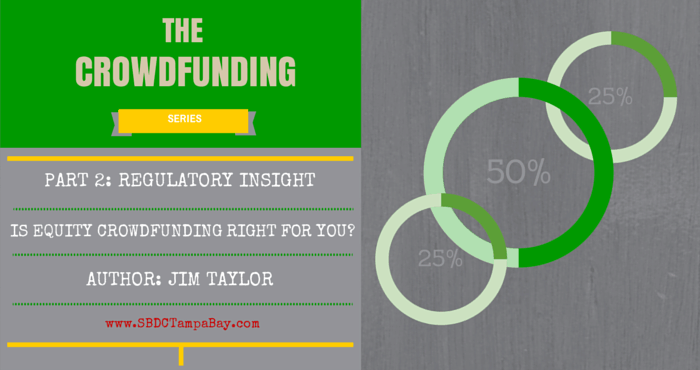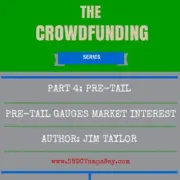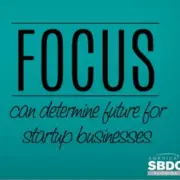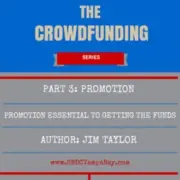Understanding regulatory insight of crowdfunding
by Jim Taylor | September 29, 2014
Part 2 of a 4-part Series
“Duncan Niederauer, CEO, NYSE”]Crowdfunding, if done properly, is the future for how most small businesses in this country are going to be financed.”
As we mentioned in “Crowdfunding Primer,” crowdfunding has the potential to greatly increase access to capital for small businesses. However, crowdfunding to date has mostly been used for creative or non-profit ventures through reward and donation sites such as KickStarter and IndieGoGo. One of the reasons for this is the strict securities laws the SEC imposes in the U.S.
Historically the SEC and state securities laws have mandated that investors in high-risk ventures or start-up companies be what is called an “accredited investor.” Typically, an accredited investor is a person who makes at least $200,000-$300,000 a year and have a net worth excluding residence of $1 million dollars. These investors typically are sought out as Angel investors, providing seed or equity capital in partnerships or owning shares of companies.
The theory behind the accredited investor rules is that they can afford to lose their investment or that they are “sophisticated” enough to understand the risks of the venture, and that a loss will not cause them to go broke since they have adequate assets or income. This is a form of consumer protection provided in Rule 501 of Regulation D (Reg D). The amendment sets the amounts for the investor to not exceed 1) the greater of $2,000 or 5% of the annual income or net worth of the investor (under $100,000 year income/net worth) and 2) or 10% of the annual income or net worth of the investor (over $100,000 year income/net worth). Section 302 of the Act requires that all offerings be offered through a broker dealer registered with the SEC and a member of the Financial Industry Regulatory Authority (FINRA).
The Jobs Act of 2012, Jumpstart Our Business Startups Act, was intended to encourage funding of small businesses by easing the securities regulation through crowdfunding and a lowering of the restrictions. Though the bill passed, and technically equity crowdfunding should be able to be pursued as of this writing, the government has not given approval for going ahead.
The Jobs Act of 2012 has opened up the door for crowdfunding, but there remain certain detailed requirements for issuers of the crowdfunding and regulatory requirements that are still best handled by a securities attorney particularly as State securities laws have governing bodies that oversee and enforce such laws and each state is different.
In addition the shares issued in a crowdfunding offering are restricted for resale on the market for one year. There are investment thresholds. If you are seeking under $100,000, the offer can proceed without reviewed financials. Raising from $100,000 to $500,000 the financials must be reviewed and raising $500,000 to the $1 million cap will require audited financials.
As of this writing you cannot use equity crowdfunding for non-accredited investors under the Jobs Act. You can however raise funds from accredited investors under the old “Reg D” securities laws with platforms like CircleUp, which has the crowdfunding model under existing laws.
So, is equity crowdfunding right for your business? Currently if you are willing to still comply with the Accredited Investor requirements of Reg D and can find a comparable platform that works for your business, yes. However, equity crowdfunding for the broader participants who are not accredited-investors is expected to be allowed by the end of 2014, and that is where the larger opportunity lies for companies and the future of small business financing. Equity crowdfunding can be an impactful opportunity to the start-up business community, but the required financials, legal documentation, appropriate platform, and registration requirements are substantial. If equity crowdfunding is of interest to you, make sure you conduct the due diligence and get the proper legal advisors before seeking investors.









